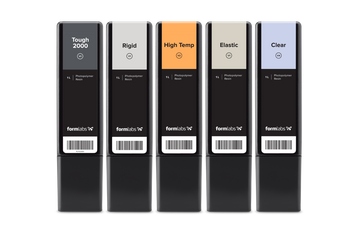With Ultimaker, MNNTHBX found a more efficient way to design and produce prototyped parts in the small bore motorcycling industry. By switching from traditional methods of manufacturing to 3D printing, the team replaced dozens of hours at the CNC mill and saw a 90% reduction in raw material cost.
Reducing raw materials costs by 90% and saving thousands on design
3D printing on Ultimaker mitigates risk, and opens the door to creating working concepts on extremely low investment. Long gone are the days of spending thousands of dollars running multiple prototypes through traditional CNC machining methods. When we take a design to the machine shop, we know before we start that it’s a fully functional design meeting our standards.
- Greg Hatcher, Owner of MNNTHBX
Challenge and solution
Challenge
MNNTHBX previously outsourced prototype production of small bore motorcycle parts to CNC mills, which was a costly and time-consuming solution to their product needs. This process cost the team anywhere from $1,500 to $2,500 per part, and required a week of production time before they were able to see a finished prototype. MNNTHBX needed a faster, more cost-efficient option for the design process—one that would allow them to secure prototypes directly onto motorcycles for tolerance and fitment testing.
Solution
After purchasing an Ultimaker 2+ in April of 2016, Greg saw an immediate return on investment. There was a measurable 90% savings on raw material costs as they switched from aluminum to PLA filament for their 3D printed parts. Additionally, prototype production time decreased from one week at the CNC mill to 12 hours on average per part. Greg estimates that they now spend approximately $200 prototyping on their Ultimaker 2+ printer; and average of $1,800 savings for each new design.
Cost comparison
With parts prototyped on Ultimaker, they experienced immediate ROI and have continuous cost savings.
As owner Greg Hatcher states, “The simple truth is that our return on investment was nearly instant. Our printer basically paid for itself the first time we saw a product through prototyping. Being that we prototype roughly 15 products annually, the costs savings become apparent.”
Results
Increased money and time savings: Their Ultimaker runs for an average of 15 hours per week—which replaces 75 hours of machine time from traditional methods—and saves 90% on raw materials by swapping aluminum for PLA.
Freedom to design and redesign quickly: Without having to rely on an outsourced CNC mill, the MNNTHBX team creates new prototypes quickly with just 1-5 iterations per part. This eliminates excess wait time for new designs through testing phases.
Functional prototypes for testing: They now have the capability to mount PLA prints directly onto motorcycles for thorough testing of extremely tight tolerances and custom designs. This eliminates risk of failure after manufacturing.
Flexibility to customize each iteration: The MNNTHBX team is able to test custom designs on Ultimaker 2+ that are otherwise too financially risky to outsource, and chase the winning prototypes once they are proven to be the best option for production.







